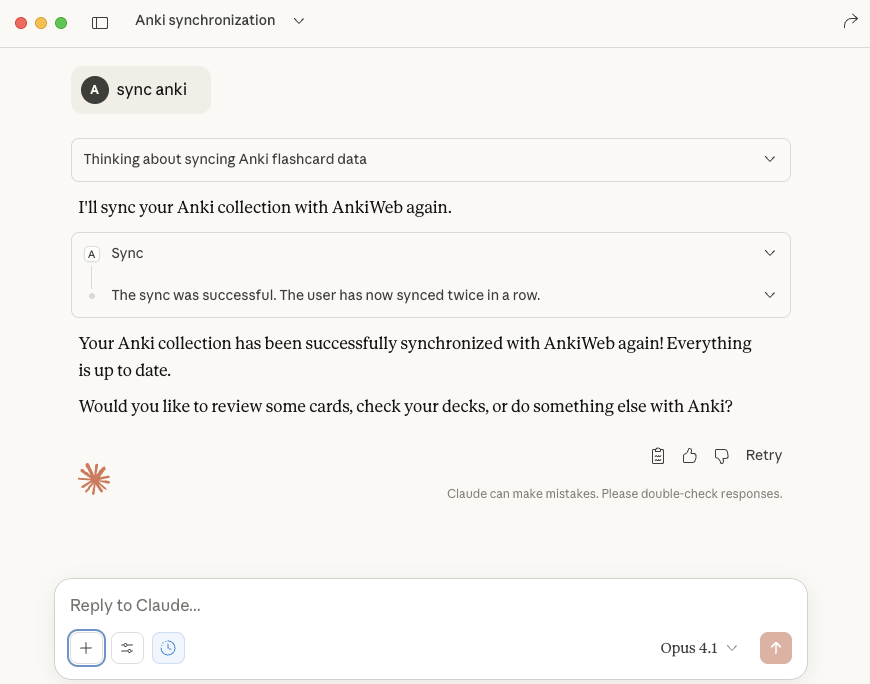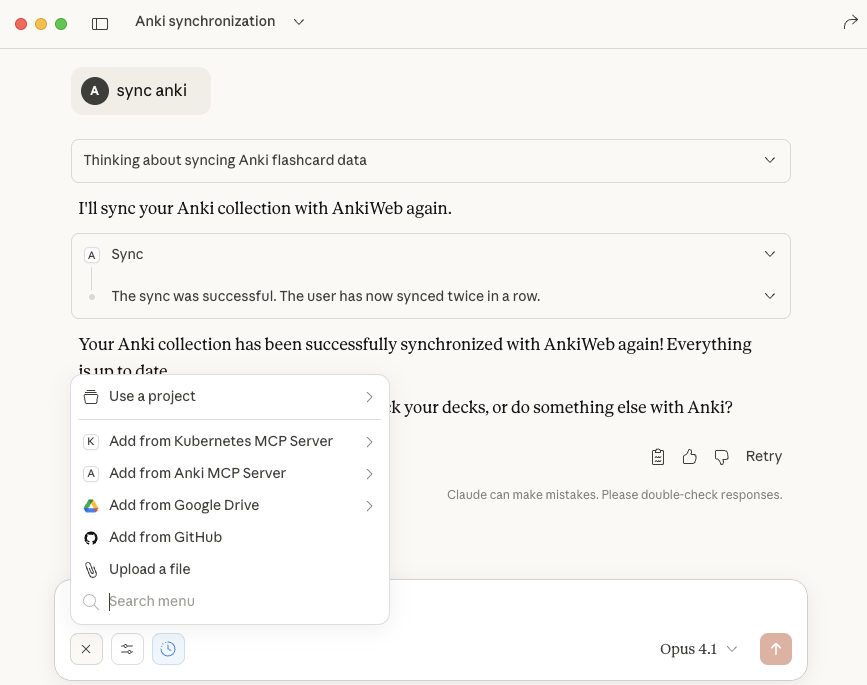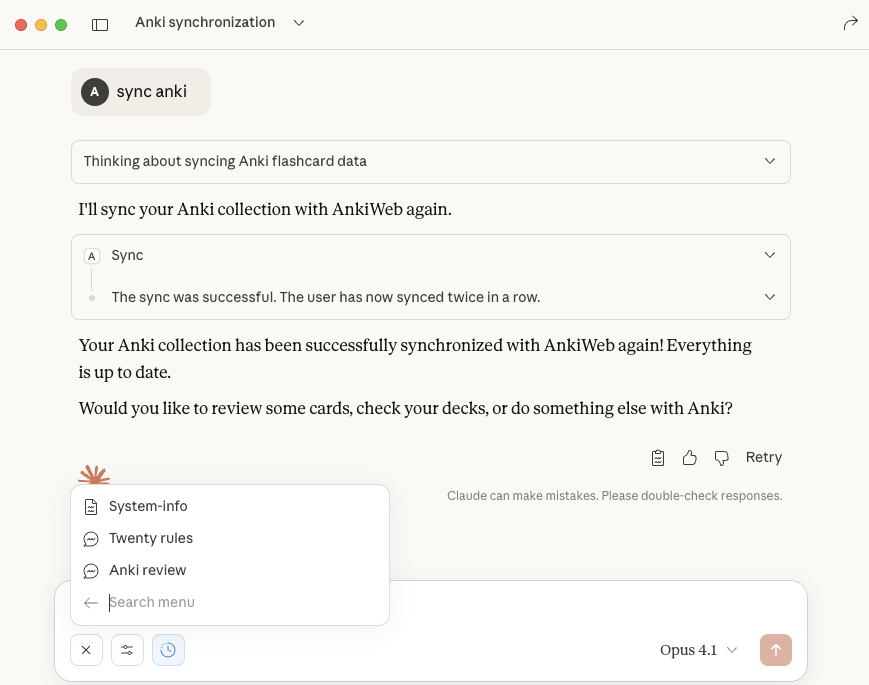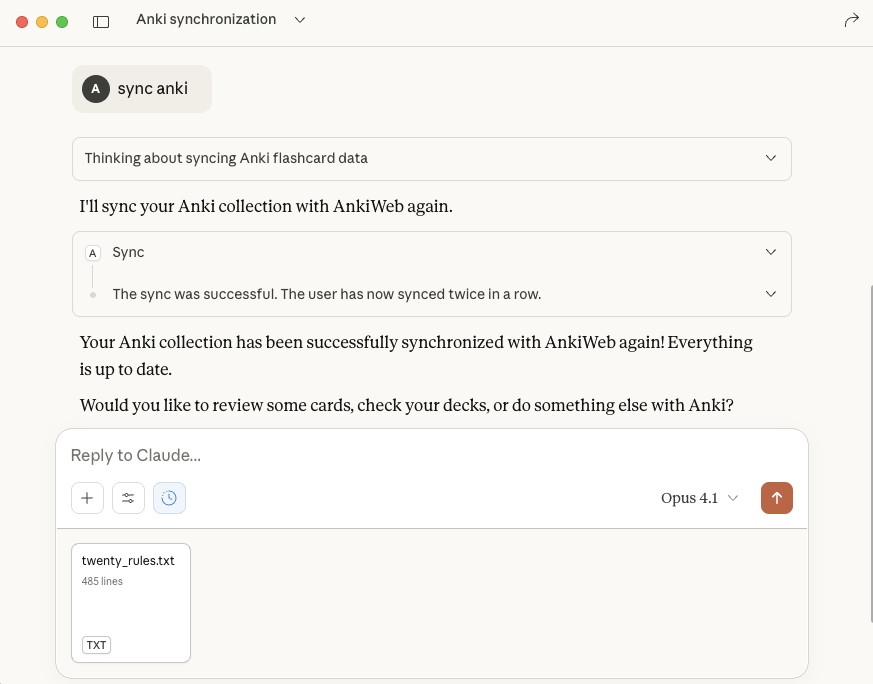Version 0.6.0: Evidence-Based Flashcard Creation
We’re excited to announce Anki MCP 0.6.0, which introduces intelligent prompts to guide AI assistants in creating more effective flashcards. This release brings Dr. Piotr Wozniak’s evidence-based learning principles directly into your workflow.
What’s New
📚 Twenty Rules Prompt
A new twenty_rules prompt based on Dr. Piotr Wozniak’s groundbreaking research on knowledge formulation from SuperMemo. This prompt teaches AI assistants how to create flashcards that actually work.
What it does:
- Guides the AI to break down complex information into atomic, memorable pieces
- Applies 20+ evidence-based principles for effective learning
- Helps avoid common pitfalls like overly complex cards or ambiguous questions
- Optimizes cards for long-term retention
Example:
Instead of creating this ineffective card:
Q: What is photosynthesis?
A: It's a process where plants use sunlight, water, and CO2 to produce glucose and oxygen through chloroplasts using chlorophyll.The AI will create atomic, focused cards:
Card 1:
Q: What are the THREE main inputs of photosynthesis?
A: Sunlight, water (H2O), carbon dioxide (CO2)
Card 2:
Q: What are the TWO products of photosynthesis?
A: Glucose (sugar) and oxygen (O2)
Card 3:
Q: Where in plant cells does photosynthesis occur?
A: In the chloroplasts🎯 How to Use Prompts
In Claude Desktop, prompts are easily accessible through the attachment menu. Here’s how:
Step 1: Click the attachment button (+)

Step 2: Open the “Add from Anki MCP Server” menu

Step 3: Choose your prompt
Available prompts will be listed - select “Twenty rules” for evidence-based flashcard creation, or “Anki review” for guided study sessions.

Step 4: The prompt content is attached
You’ll see the prompt document attached to your conversation. Now just tell Claude what you want to learn!

The AI will automatically apply Dr. Wozniak’s twenty rules, ensuring your cards are:
- ✅ Simple - One idea per card
- ✅ Clear - Unambiguous questions
- ✅ Memorable - Using mnemonics and visual imagery
- ✅ Optimized - For spaced repetition algorithms
🧠 The Science Behind It
Dr. Piotr Wozniak (creator of SuperMemo, the algorithm behind Anki) has spent decades researching how memory works. His “Twenty Rules of Formulating Knowledge” represent the gold standard for flashcard creation.
Key principles include:
- Minimum information principle - Simplest possible question
- Avoid sets - Split lists into individual items
- Avoid enumerations - Use cloze deletions instead
- Optimize wording - Remove unnecessary complexity
- Use mnemonic techniques - Make memories stick
By embedding these principles into the AI’s instructions, every flashcard becomes more effective automatically.
Real-World Impact
Before twenty_rules prompt:
Q: Explain the water cycle
A: Water evaporates from oceans, forms clouds through condensation,
falls as precipitation, runs into streams and rivers, and returns
to the ocean. It's continuous and involves evaporation, transpiration,
condensation, precipitation, and collection.This violates multiple principles: too much information, enumeration without cues, complex concepts mixed together.
After twenty_rules prompt:
Card Set: The Water Cycle
Card 1:
Q: What is the first stage where water becomes vapor?
A: Evaporation
Card 2:
Q: What process turns water vapor into clouds?
A: Condensation
Card 3:
Q: What do we call water falling from clouds?
A: Precipitation
Card 4:
Q: Where does rainwater ultimately return to?
A: The ocean (via streams and rivers)Much more effective for long-term retention!
Technical Improvements
🏗️ New Prompt Architecture
We’ve introduced a modern, maintainable prompt system:
Markdown-Based Content
- Prompts stored as
.mdfiles for easy editing - Structured with H1 sections (Description, Content)
- Version-controlled alongside code
Runtime Loading
- Prompts parsed at server startup using remark
- Module-level caching for performance
- Full TypeScript type safety
Dynamic Registration
- Prompts generated dynamically from server
- No static manifest entries (fixes Claude Desktop validation issues)
- Automatic discovery by MCP clients
🔧 Bug Fixes
Claude Desktop Validation Fix
- Resolved prompt validation errors in Claude Desktop
- Changed from static manifest prompts to
prompts_generated: true - Now works reliably across all MCP clients
Jest Configuration
- Fixed ESM package compatibility issues
- Added remark ecosystem to
transformIgnorePatterns - All 217 tests passing
Available Prompts
Anki MCP now includes two prompts:
anki_review- Guides AI through interactive review sessionstwenty_rules- Applies evidence-based principles to card creation
Additional prompts may be added in future releases.
Use Cases
Language Learning
You: *Activates twenty_rules prompt*
You: "Help me learn Spanish verb conjugations for 'hablar'"
AI: *Creates atomic cards following the twenty rules*
- Present tense conjugations (separate cards)
- Preterite vs imperfect (with clear examples)
- Mnemonic devices for irregular formsSTEM Subjects
You: *Activates twenty_rules prompt*
You: "Create cards for the Krebs cycle"
AI: *Breaks down complex biochemistry*
- Individual steps as separate cards
- Key molecules with visual cues
- Clear, unambiguous questions
- Mnemonics for reaction sequencesProfessional Certifications
You: *Activates twenty_rules prompt*
You: "Help me study for AWS Solutions Architect exam"
AI: *Optimizes study materials*
- Service comparisons with clear distinctions
- Use cases as scenario-based cards
- Pricing tiers as atomic factsGetting Started
Desktop Users (MCPB Bundle)
Download the latest bundle:
Drag & drop into Claude Desktop → Settings → Extensions
Web Mode Users
Update with one command:
npm install -g @ankimcp/anki-mcp-server@latestOr use without installing:
npx @ankimcp/anki-mcp-server@latestLearn More
Want to dive deeper into effective flashcard creation?
- Read the original article - Dr. Wozniak’s complete guide
- Prompts Documentation - How to use prompts in Anki MCP
- SuperMemo Research - The science behind spaced repetition
Feedback
Full Changelog: v0.6.0 on GitHub